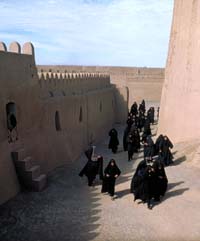ARC cited as critical United Nations partner in ecology-faith partnerships
October 27, 2008:
 |
 |
 |
ARC's vision is of people, through their beliefs, treading more gently upon the earth.
|
The Times Herald
features the new partnerships forged by the United Nations with religious communities... And uses ARC's work as a major example.
(This article was originally published in One Country, The newsletter of the Baha'I International community, and was republished in the Times Herald, on July 4, 2008).
UNITED NATIONS - With words like "peace," "dialogue," and "cooperation" salted through its agenda, the program for a special hearing of the General Assembly last autumn might have been any of a thousand meetings here.
But what made the 4-5 October 2007 "High-Level Dialogue and Informal
Interactive Hearing with Civil Society on Interreligious and Intercultural
Understanding and Cooperation for Peace" different was the degree to which a
new actor was spotlighted before the UN's most globally representative body.That new actor was religion - or, rather, people who directly represent
religious communities from around the world.
"What is new is that the president of the General Assembly was calling for
this kind of a hearing on religion and intercultural cooperation for peace,"
said Bani Dugal, the principal representative of the Baha'i International
Community to the UN. "You've never really had the General Assembly reach out
to this sector of global civil society before."
The General Assembly, however, is not the only UN body that is reaching out
to religious groups. Spurred in part by the threat of religion-inspired
violence that was so starkly demonstrated in the 11 September 2001 attacks
on the World Trade Center, and also by an increasing recognition of the
power of religious belief to inspire social action, the UN and its agencies
have recently launched a number of initiatives that involve ever closer
collaboration with world religious communities. Such initiatives include:
* The Alliance of Civilizations. Established in 2005 at the initiative of
Spain and Turkey, under the auspices of the UN, the Alliance aims to improve
understanding and cooperative relations mostly among Western and Islamic
nations and peoples and "to help counter the forces that fuel polarization
and extremism."
* The Tripartite Forum on Interfaith Cooperation for Peace. Founded in 2006,
the Tripartite Forum is an open-ended consultative group composed of
representatives of UN member states, the United Nations system, and
non-governmental organizations that aims to foster mutual respect, tolerance
and friendship among peoples, cultures, and religions.
* A new collaboration/partnership between the UN Development Programme
(UNDP) and the Alliance of Religions and Conservation (ARC) to better
involve world religions in addressing climate change and specifically to
help religions develop concrete programs of action to slow global warming.
* The "Culture Matters" review by the UN Population Fund (UNFPA). Published
in 2004, this report offered a series of case studies from the Fund's
efforts to work with "communities and faith-based organizations." It
concluded, among other things, that partnerships with "religious and
faith-based organizations" can help "reach some of the most vulnerable and
marginalized communities" in development efforts.
 |
 |
 |
The faiths possess a prestige and authority in many parts of the world where few others are heard. |
In December, as well, the General Assembly adopted a resolution declaring
2010 the Year of Rapprochement of Cultures, and recommended that appropriate
events be organized on interreligious and intercultural dialogue, including,
among others, a high-level dialogue and/or informal interactive hearings
with civil society.
"I believe there is a sea change taking place at the United Nations," said
Joan Kirby, the UN representative of the Temple of Understanding, in a
recent speech in London. "Member states are recognizing that religious
traditions hold the key to peace and security or alternatively, the misuse
and misunderstanding of religion can incite violence and bring chaos to the
world."
The UN has always dealt with religions in their capacity as
humanitarian-oriented non-governmental organizations. During World War II,
religious groups gave input to discussions on the UN Charter. And, after the
UN's founding in 1945, many religions entered into consultative status with
the UN as non-governmental organizations. The Baha'i International
Community, for example, has had observer status with the UN Department of
Public Information since 1948.And UN agencies have long collaborated with religious NGOs in the promotion
of development and social welfare.
"It has always been an assumption that working with faith-based communities
is essential for the achievement of the Millennium Development Goals," said
Jordi Llopart, program coordinator of the UN Millennium Campaign.
"Faith-based communities have been working on the ground for many years.
They know malnutrition. They know ill health. They have been working with
the poorest of the poor. And in the global south, they are often trusted
more than anyone else," said Mr. Llopart. But beyond the field of development, the UN has in the past hesitated to
become too closely involved with "religious" issues.
"The UN is an intergovernmental mechanism, and governments are wary of
directly cooperating with religions," said Hilario G. Davide, the permanent
representative of the Philippine Mission to the UN, which helped found the
Tripartite Forum. "On the other side, religions do not believe that they are
inferior or subordinate to governments or even to other religions because
they function in a world distinct from the secular concerns of
intergovernmental cooperation."
What has changed, said Ambassador Davide and others, is the emergence of a
new understanding that closer collaboration with religions is critical to a
wide range of UN efforts, not only in development but also to the UN's main
mission of promoting peace and security.
"If we are to go over the statements of the more than 80 high-level
personalities who attended the High-Level Dialogue on Interreligious and
Intercultural Understanding and Cooperation for Peace [in October]," said
Ambassador Davide, "we will note that several speakers alluded to the
importance for the interaction between the UN system and the faith
communities in the discharge of the three pillars of the UN goals, namely,
the promotion of peace, development and human dignity."
"One of the conclusions that could be drawn," he added, "is that the
partnership between and among governments, the UN system and religious NGOs
or faith communities is no longer an option but a necessity."
As noted above, new initiatives are emerging from a wide range of issue
areas, involving many UN bodies and agencies. One new element is a focus on
practical steps beyond mere talk.
For example, at the Alliance of Civilizations' first major meeting, held in
Madrid 15-16 January 2008, participants issued a list of "major outcomes"
that announced a series of concrete actions. These include a $100 million
Global Youth Employment Initiative and a multimillion dollar Media Fund,
both defined as efforts to support the Alliance's focus on the relationship
between Western nations and predominantly Muslim populations and,
specifically, efforts to reduce factors that contribute to extremism.
 |
 |
 |
ARC's real strength lies in our networks, as well as in the people that each faith has appointed to work on environmental issues.
|
The UNDP's new initiative with the ARC on climate change aims also at
concrete action. Under the terms of that initiative, Baha'i, Buddhist,
Christian, Taoist, Hindu, Jain, Jewish, Muslim, Shinto, Sikh and Zoroastrian
leaders will be invited to commit their communities to projects that address
climate change and the protection of the natural environment in "practical
ways"--from "forestry conservation to organic farming schemes to
introducing, promoting and financing alternative energy sources," according
to the ARC.
The December 2007 General Assembly resolution likewise encourages
governments to "identify areas for practical action in all sectors and
levels of society for the promotion of interreligious and intercultural
dialogue, tolerance, understanding and cooperation."
The Tripartite Forum, which focuses on dialogue, can also lead to action,
said Ambassador Davide. "Before a treaty is agreed by member states, it
generally takes a number of years of discussions, negotiations and
consultations before consensus is arrived at," he said. "It is, therefore,
not a waste of time for governments to deliberate on how to harness the
partnership of religious communities in the achievement of UN goals no
matter how long is the process of consultations."
The discussion at the "informal, interactive" segment of the High-Level
Dialogue in October reflected many of the new ideas needed to promote
religious dialogue--as well as some of the thorny issues that lie ahead. The segment brought together some 20 non-governmental speakers representing
a variety of cultures and religious traditions, including representatives
from the Baha'i Faith, Christianity, Hinduism, Islam, Jainism, and Judaism.
Participants included Paul Knitter of the Union Theological Seminary, Gamal
I. Serour of the International Islamic Center for Population Studies and
Research at the Al Azhar Centre in Egypt, Sohan Lal Gandhi of the Anuvrat
Global Organization in India, Fatima Ahmed of Zenab for Women in Development
in Sudan, Steven Rockefeller of Earth Charter International in the United
States, and Mitra Deliri of the Baha'i International Community.
"The religions are part of the problem," said Dr. Knitter. "They are a
source of conflict and violence among nations and ethnic groups." The
solution, he suggested, lies in "a model of an egalitarian community of
communities, in which the unique validity and value of each community, each
religion, are affirmed and engaged, but no religion claims to be superior or
dominant."
General Assembly President Srgjan Kerim said while "cultures and religions
are being pulled ever closer together by a web of telecommunications and
economic links" these encounters also "reveal deep-rooted misunderstanding.
"However," he continued, "we have the unrivaled opportunity to replace
intolerance and discrimination with understanding and mutual acceptance.
Open and sustained dialogue, respect for freedom of expression and freedom
of religion or belief is fundamental to this endeavor."
Ms. Deliri focused on the situation in Tanzania, where she resides. There,
she said, "large Christian and Muslim populations" have found a way to live
together peacefully, "side-by-side," often intermarrying and attending each
other's religious festivals.
"It is a living example of religious pluralism," she said. "This coexistence
did not come about by accident but rather as a result of the vision and
deliberate action of Tanzanian leaders, dating back to the country's first
president ...," she said.
Ms. Deliri also pointed to religious freedom as a key to tolerance, saying
that governments must work to create a climate where freedom of religion or
belief is clearly upheld in law and in practice. "Such a climate must be free from incitements to violence or hostility in
the name of religion," she said. "Where contentious opinions about religions
are expressed, it is the responsibility of the state to provide for right of
reply."
*****Links
Link here to read other articles about ARC in the media.
Link here to see Videos and Podcasts on Religions and the natural Environment.
Link to download
a leaflet on the Seven Year Plan.
|

